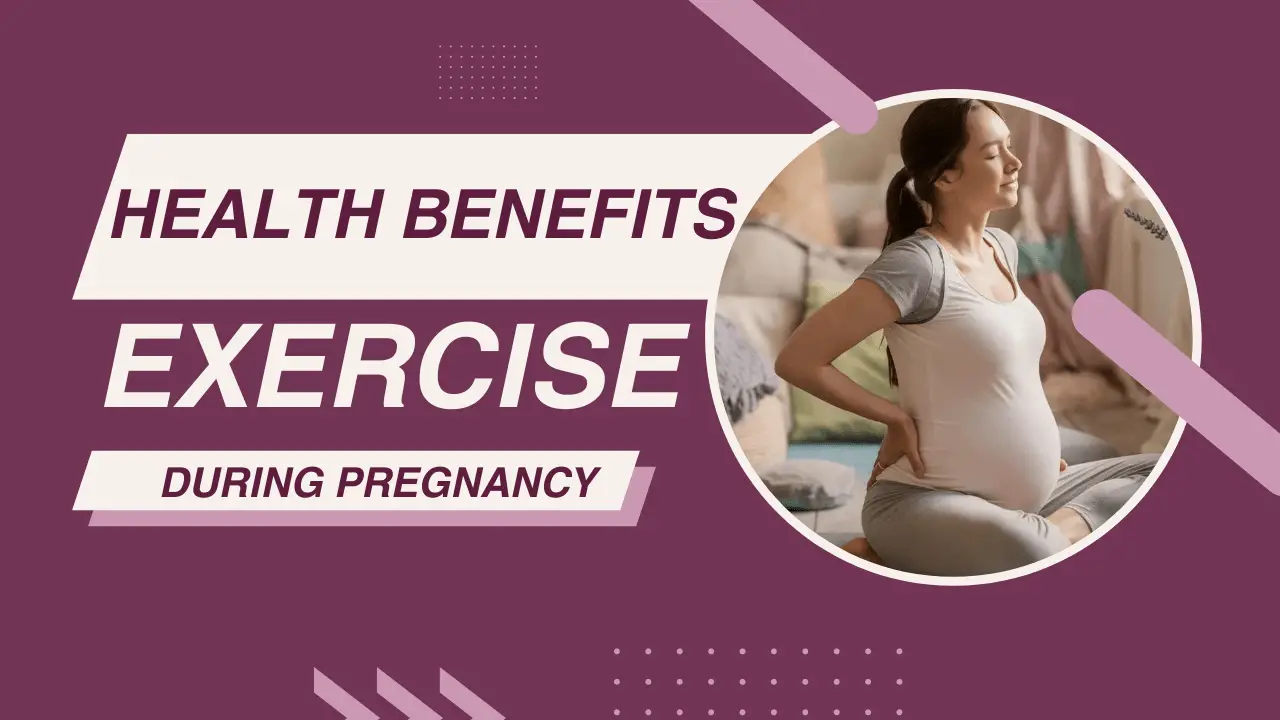A woman’s life is profoundly altered both physically and emotionally during her pregnancy. Exercise during pregnancy offers many health benefits and shouldn’t be disregarded, even if relaxation and a healthy diet are frequently stressed.
Regular physical activity has been shown to improve a pregnant woman’s overall health in a major way, with benefits that accrue over time for both the mother and the unborn child.
While many expectant moms may be concerned and know about the health benefits of exercise during pregnancy, it may be a beneficial and safe habit with the right advice and adjustments.
In order to promote a healthier, happier pregnancy journey, we will discuss ten unexpected health advantages of fitness in this blog article that every pregnant woman should be aware of.
Improved Mood and Reduced Stress:
An emotional rollercoaster, pregnancy is frequently accompanied by elevated stress levels and mood changes. Thankfully, regular exercise can be an effective strategy for overcoming these obstacles.
Physical activity triggers the body’s natural mood enhancers, endorphins, to be released. These feel-good hormones aid in reducing irritation, anxiety, and depression—all of which are typical during pregnancy.
Exercise can also be a very effective way to manage stress. Pregnant women can release tension and release pent-up energy by engaging in regular exercise. Engaging in physical activity also contributes to better sleep, which is another important aspect of stress management and mood maintenance.
By prioritizing exercise, expectant mothers can experience a significant boost in their overall mental and emotional well-being, contributing to a healthier and more enjoyable pregnancy journey.
The health benefits of exercise during pregnancy extend far beyond physical fitness. Regular physical activity plays a crucial role in supporting mental and emotional health, helping to alleviate stress and improve mood.
Better Sleep Quality:
Another notable health benefit of exercise during pregnancy is the enhancement of sleep quality. Pregnancy can often disrupt sleep due to physical discomfort, hormonal changes, and increased anxiety. Engaging in regular physical activity can help alleviate these issues, leading to more restful and rejuvenating sleep.

How Regular Exercise Contributes to Better Sleep Patterns
Exercise helps regulate the body’s internal clock, also known as the circadian rhythm, which governs sleep-wake cycles. Physical activity increases body temperature, and the subsequent drop in temperature post-exercise can promote sleepiness.
Moreover, exercise reduces stress and anxiety levels, which are common culprits of insomnia and poor sleep during pregnancy. By managing stress through exercise, pregnant women can experience more relaxed and uninterrupted sleep.
Tips for Incorporating Exercise into a Daily Routine for Better Sleep
To maximize the health benefits of exercise during pregnancy, including better sleep quality, aim for a regular exercise routine earlier in the day. Calming exercises like light stretching or relaxation can further enhance sleep quality and ensure a more restful sleep.
For pregnant women seeking to improve the quality of their sleep, this means choosing the right type and timing of exercise. Gentle, low-impact exercises like walking, swimming, and prenatal yoga are particularly beneficial.
These activities can be performed safely throughout pregnancy and are effective in promoting relaxation and reducing physical discomfort.
Enhanced Cardiovascular Health:
Among the various health benefits of exercise during pregnancy, enhanced cardiovascular health stands out as particularly significant. Cardiovascular health is crucial for maintaining overall well-being, and regular physical activity can help ensure that the heart and circulatory system function optimally during pregnancy.

Benefits for Heart Health and Circulation
By strengthening the heart muscle, boosting blood circulation, and optimizing the body’s oxygen utilization, exercise promotes cardiovascular health. A woman’s heart has to work harder throughout pregnancy to pump the extra blood volume needed to nourish the growing baby.
Frequent exercise lowers the likelihood of problems like high blood pressure and preeclampsia by assisting the heart in adapting to these demands more successfully.
Better oxygen and nutrition supply to the mother and the unborn child results from improved circulation, which also supports the child’s healthy growth and well-being.
Recommended Exercises for Cardiovascular Benefits
Exercise during pregnancy can improve cardiovascular health, but it’s crucial to pick safe and efficient exercises. Swimming, stationary cycling, and brisk walking are great examples of low-impact aerobic workouts.
These exercises raise the heart rate without placing the body under undue stress. Pregnant women are generally advised to strive for at least 150 minutes per week, spaced out across many days, of moderate-intensity aerobic activity.
You should also see a doctor before beginning any new fitness regimen to be sure it’s safe for both mom and baby.
Frequent participation in these activities can improve cardiovascular health dramatically, which can lead to a more comfortable and healthy pregnancy.
Reduced Risk of Gestational Diabetes:
One of the critical health benefits of exercise during pregnancy is the reduced risk of developing gestational diabetes. Gestational diabetes is a condition characterized by high blood sugar levels that develop during pregnancy and can have significant implications for both the mother and baby.
Regular physical activity plays a vital role in managing blood sugar levels and preventing this condition.
Explanation of Gestational Diabetes and How Exercise Helps
Gestational diabetes occurs when the body cannot produce enough insulin to manage the increased blood sugar levels that occur during pregnancy. This condition can lead to complications such as preeclampsia, premature birth, and a higher likelihood of developing type 2 diabetes later in life.
Exercise helps by enhancing the body’s sensitivity to insulin, which improves glucose uptake and reduces blood sugar levels. Physical activity also helps maintain a healthy weight, which is another crucial factor in managing and preventing gestational diabetes.
Safe Exercises for Managing Blood Sugar Levels
To effectively reduce the risk of gestational diabetes, pregnant women should engage in regular, moderate-intensity exercises that are safe for their condition. Exercises like swimming, walking, and prenatal aerobics are great options.

These low-impact workouts support healthy weight management and enhance insulin sensitivity without overtaxing the body. To get the most out of your activity, try to get in at least 150 minutes a week of moderate exercise spread over a few days.
Pregnant women should speak with their healthcare professional before beginning any exercise program to be sure the exercises are safe and suitable for their particular health issues.
Expectant moms can greatly reduce their risk of gestational diabetes by including these workouts in their regimen. This will help to promote a healthy pregnancy and better results for the mother and the unborn child.
Improved Muscle Tone and Strength:
Improved muscle tone and strength are significant health benefits of exercise during pregnancy. Maintaining and enhancing muscle strength is crucial for supporting the additional weight and physical changes that occur during pregnancy, and it also prepares the body for labor and postpartum recovery.
Importance of Muscle Strength During Pregnancy and Labor
Strong muscles provide better support for the body, helping to reduce common pregnancy-related aches and pains, such as back pain. Enhanced muscle tone also improves posture, which can be beneficial as the center of gravity shifts and balance becomes more challenging.
During labor, strong muscles, particularly in the core and pelvic area, can make the process smoother and less strenuous by providing better control and endurance. Additionally, good muscle tone aids in quicker postpartum recovery, as the body can bounce back more effectively after childbirth.
Exercises to Enhance Muscle Tone and Strength
To improve muscle tone and strength during pregnancy, it is essential to engage in safe and targeted exercises. Strength training with light weights, resistance bands, or bodyweight exercises such as squats, lunges, and modified push-ups can be highly effective.
Prenatal Pilates and yoga are other great options because they emphasize increasing general muscle tone, strengthening the core, and increasing flexibility. In order to prevent damage, these exercises should be carried out correctly in terms of form and technique, either with permission from a healthcare professional or under the supervision of a qualified teacher.
Combining cardiovascular exercises with strength training two to three times a week can yield a well-rounded fitness regimen with several advantages. It’s critical to pay attention to your body’s signals, refrain from overdoing it, and adjust as needed as your pregnancy goes on.
Pregnant women who use these exercises can enhance their muscular tone and strength, which will facilitate an easier delivery and a quicker recovery after giving birth.
Easier Labor and Delivery:
One of the notable health benefits of exercise during pregnancy is the potential for easier labor and delivery. Regular physical activity can significantly enhance a woman’s endurance, strength, and overall physical preparedness for childbirth, making the labor process smoother and potentially less complicated.
How Regular Exercise Prepares the Body for Childbirth
Engaging in regular exercise helps build endurance and stamina, which are crucial during labor, a physically demanding process. Activities like walking, swimming, and prenatal aerobics improve cardiovascular health, ensuring that the mother can better cope with the prolonged exertion of labor.
Additionally, strength training and core exercises enhance muscle tone, particularly in the pelvic floor, abdomen, and lower back. These muscles play a vital role during delivery by supporting the uterus, bladder, and bowel and contributing to more effective pushing during childbirth.
Real-life Testimonials from Moms Who Exercised During Pregnancy
Many pregnant women who continue their workout regimen say that labor and delivery go more smoothly. For example, some moms discover that leading an active lifestyle shortens the time it takes to go into labor and helps them better manage labor pain.
Prenatal yoga, for example, which emphasizes mental calm, flexibility, and breathing techniques, can also offer vital tools for controlling contractions and focusing during birthing. Expectant women who are thinking about including exercise in their pregnancy routine may find inspiration and encouragement from these true stories.
To maximize the health benefits of exercise during pregnancy, including easier labor and delivery, it is important to consult with a healthcare provider to create a safe and effective exercise plan. By staying active, pregnant women can enhance their physical readiness for labor, potentially leading to a smoother and more manageable delivery experience.
Faster Postpartum Recovery:
One of the significant health benefits of exercise during pregnancy is faster postpartum recovery. Staying active during pregnancy helps maintain muscle tone, cardiovascular fitness, and overall physical strength, which can greatly aid in the body’s recovery process after childbirth.
Gentle Postpartum Exercises to Consider
Maintaining mild exercise after giving birth, such as postnatal yoga, pelvic floor exercises, and walking, improves recovery. These exercises increase circulation, strengthen muscles, and enhance general well-being.
It is possible to have a faster and more comfortable recovery by beginning with low-impact workouts and progressively increasing the intensity as the body heals. To ensure safety and efficacy, always get advice from a healthcare professional prior to beginning or returning to any postpartum exercise regimen.
Reduced Back Pain and Discomfort:
One of the key health benefits of exercise during pregnancy is the reduction of back pain and discomfort. As pregnancy progresses, the growing belly puts extra strain on the back muscles and spine, often leading to pain and discomfort.

Specific Exercises to Target Back Pain Relief
Engaging in regular physical activity, such as prenatal yoga, swimming, and gentle stretching exercises, can help strengthen the back and core muscles. These exercises improve posture and provide better support for the spine, alleviating pressure and reducing pain.
Additionally, strengthening the pelvic floor and abdominal muscles can further enhance stability and comfort during pregnancy. Always consult with a healthcare provider to ensure exercises are safe and appropriate for individual needs.
Enhanced Overall Health and Wellbeing:
One of the most comprehensive health benefits of exercise during pregnancy is the enhancement of overall health and well-being. Regular physical activity supports physical fitness, mental health, and emotional stability, contributing to a healthier pregnancy experience.
Summary of Overall Health Benefits
Engaging in exercise improves cardiovascular health, boosts mood, reduces stress, and enhances sleep quality. It also helps manage weight, prevents gestational diabetes, and strengthens muscles, leading to better support for the changing body.
These combined benefits promote a sense of well-being and prepare the body for labor and postpartum recovery, ensuring a healthier journey for both mother and baby.
Conclusion:
In conclusion, the health benefits of exercise during pregnancy are extensive and invaluable. Regular physical activity improves mood, enhances cardiovascular health, reduces the risk of gestational diabetes, and alleviates back pain, among other benefits.
It also prepares the body for easier labor and faster postpartum recovery. By incorporating safe and effective exercises into their routine, expectant mothers can ensure a healthier, more comfortable pregnancy for both themselves and their babies. Click to learn more.
FAQs:
- Is it safe to exercise during pregnancy?
-
- Yes, exercising during pregnancy is generally safe and beneficial, but it’s important to consult with your healthcare provider to ensure the activities you choose are appropriate for your condition.
- What types of exercises are best during pregnancy?
-
- Low-impact activities such as walking, swimming, and prenatal yoga are ideal. These exercises help maintain fitness without putting excessive strain on the body.
- How often should I exercise while pregnant?
-
- Aim for at least 150 minutes of moderate-intensity exercise per week, spread out over several days.
- Can exercise help with pregnancy-related back pain?
-
- Yes, regular exercise can strengthen the back and core muscles, improve posture, and reduce pregnancy-related back pain.
- Will exercising during pregnancy make labor easier?
-
- Regular exercise can enhance endurance and muscle strength, potentially making labor and delivery smoother and less strenuous.
